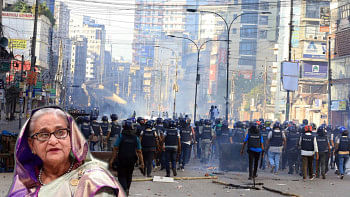When history will look for Narendra Modi
While he was talking to an Indian daily last Saturday, Indian Prime Minister Narendra Modi compared the Land Boundary Agreement between his country and Bangladesh to the fall of the Berlin Wall. It could be that he said it without realising he was mixing apples and oranges. The LBA signified reconciliation while the Berlin Wall signified unification. Modi must have meant to calibrate the historical significance of these two mega milestones instead of emphasising on their factual substance. Hope it wasn't a veritable Freudian slip, but a virtual slip of tongue.
That doesn't change the fact that this Indian Prime Minister deserves our heartfelt gratitude for his momentous accomplishment. He has solved within his first year in office a long-simmering bone of contention between the two countries. He has rightly said that the LBA has been "a massive achievement". And the credit goes to him for his leadership style and negotiation skills. It was he who pushed the bill through the Indian parliament "by taking all parties into confidence."
Modi is also correct in saying that "the entire mood of our neighbourhood has changed dramatically because of our message of shared prosperity being implemented on the ground." An opinion survey on the eve of his arrival tomorrow would have shown that more people in this country are favourably disposed toward India compared to a month ago. More people are excited about a slew of new deals that are expected to be signed during his stay. India and Bangladesh are going to get involved with each other in more ways than before.
The next two days will be busy for both sides. They will be signing deals, wining and dining together and wheeling and dealing on behalf of their respective countries. The politicians of this country are going to woo Narenda Modi, playing their wonderful charm to the hilt. A dozen more deals will bring Bangladesh more money, roads, bridges, electricity and ICT benefits, some of which, hopefully, will trickle down to the man on the street.
But lurking beneath the surface is the desperate bid of our politicians to win the blessings of this VVIP guest. As Khaled Hosseini writes in The Kite Runner, "Attention has shifted to him like sunflowers turning to the sun." Rightly or wrongly, the popular perception is that India is playing an increasingly bigger role in determining the power game within.
The Indian Prime Minister might go back home with one of the two decisions: support for the people of Bangladesh or their politicians, or both. The future of the relationship between the two neighbouring countries is going to hinge on that decision. All other avenues broadened will mean nothing if the road to the minds of people gets narrowed down.
Modi, himself being a product of it, understands the efficacy of the populist system. He knows that democracy without people's choice or voice is as obnoxious as an untuned bagpipe - it makes no melody but a lot of noise. That melody tempted a tea boy to climb the high tower of power in his country. Nobody should appreciate it better than the leader of the world's largest democracy that one life is too short for anybody anywhere to be denied his or her rights to freedom and dignity.
The supreme leader of India is bringing a myriad of gifts for us. And it's not unusual that some of these gifts will have strings attached to them. The supreme interest of his country should naturally come to his mind first. If the LBA gives us hope above experience, it shows he also has consideration for others. It also shows he genuinely understands the difference between a "Big Brother" and an elder brother. The former is a bully, the latter, a blessing.
To expand on Modi's "neighbourhood" metaphor, tomorrow he will cross the street to visit a house where people have been taken over by their politicians. He is coming to a straightjacket nation where leaders of all denominations are fighting for power, while their countrymen are gagged from protesting. The crux of the problem lies in how we are going to resolve this problem. The choice is between deliverance for the people or delivering every whim of their politicians.
Celebrated Indian writer, Amitav Ghosh, launched his new book Flood of Fire on May 27. He warned that the world is going to see huge upheavals of populations. He also mentioned that Bangladesh is now facing a situation in which one metre of sea level rise will swamp almost half the country.
That likens our politics to playing with fire in a house facing rising water. Any solution for Bangladesh has to address this challenging situation. Last Saturday, Narendra Modi was looking for his place in history. This Saturday, that place will look for him provided he touches the right chord for the region's bright future.
The writer is the Editor of the weekly First News and an opinion writer for The Daily Star. Email: [email protected]

 For all latest news, follow The Daily Star's Google News channel.
For all latest news, follow The Daily Star's Google News channel. 



Comments